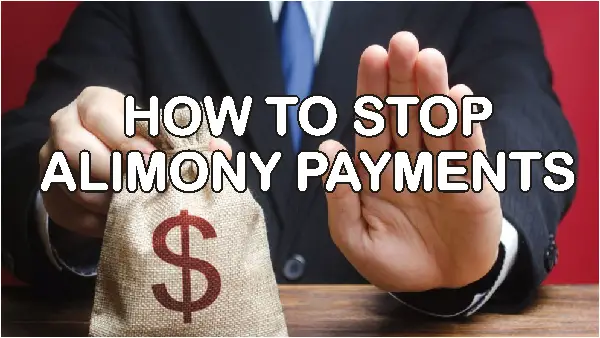
You may be wondering how to stop or reduce alimony for reasons that may or may not be in the court order. Due to change of life circumstances, there may come a time when you would want to either reduce an alimony order or terminate it completely.
This could be due to financial incapacitation or new developments in the life of the payer or the recipient spouse. Whichever is the cause, we will dissect the options that spouses can use for alimony modification.
But before you even contemplate avoiding, reducing, or terminating your alimony order, it’s imperative you have to take a look at the court order or agreement between the spouses.
Modifiable and Non Modifiable Alimony Orders
It’s not uncommon for judges to outline restrictions on modifying alimony. This simply means that the judge could have ordered some areas that cannot be modified for any reason.
The only way to stop alimony payment in such a situation is to appeal the order. It’s rare that the courts will grant such appeals unless the situation is critically understandable because nothing is cast in stone.
If however, the alimony order did not stipulate non-modification, then you can proceed to explore the legitimate options of reducing your alimony payments listed below, which we have found to be good options to avoid paying alimony.
Can Alimony be Terminated, Reduced, or Renegotiated?
Yes, alimony can be terminated, reduced, or renegotiated. But this will be determined by prevailing circumstances. Also, the burden of proof is on the paying spouse to convince the judge why the alimony has to be terminated.
If you are considering how to get out of permanent alimony, then the paying spouse must obtain a court order. They can start the procedure by submitting a “petition for termination of spousal support” to their local family law court.
How to Terminate, Reduce or Avoid Paying Alimony

How to terminate or avoid alimony payment
- Petition for termination of spousal support
In most cases, the paying spouse will need court approval before they can discontinue paying alimony. They can start the procedure by submitting a “petition for termination of spousal support” to their local family court of law.Along with their petition, the paying spouse must also present supporting documents, which include the following:
– The grounds for submitting a request to stop alimony payments earlier than originally agreed upon;– A current income statement that shows how much money they make in a given time period, how many income sources they have, how much money they make per stream, and where their major source of income originates;
– A list of recurring expenses that indicates what such expenses are and how much they cost over a specific time period; and
– Other documents which show a change in circumstances warranting the court’s approval of their petition.
If the judge grants the petition, the paying spouse will no more be legally required to provide spousal support to the recipient spouse.
- Termination of Spousal Support Letter
In some cases when the circumstances change, the recipient spouse may have to send a letter to the paying spouse, informing them to stop the payment.
Termination of Spousal Support Letter
This letter which is issued by the recipient spouse, informs the paying partner that he or she is no longer required to pay alimony due to a legal cause, thus relieving them from the commitment. The letter serves as a formal acknowledgment of the termination of the obligation to pay and does not normally require approval of a court.
To utilize this letter, the alimony-paying spouse specifies the date on which payments are no longer required and indicates why. This document demonstrates that the duty no longer applies for legal reasons, relieving him from further legal action regarding non-payment of alimony.
Conditions That Can Lead to Termination of Spousal Support
In order to stand a chance of getting an affirmative order for alimony termination or reduction, here are the conditions you have to understand, that lead to termination of the spousal support.
Whichever condition you may wish to latch upon to terminate or reduce alimony, note that the burden of proof is on you to show that your case is “more likely than not,” or 51% more likely.
1. if your ex-Spouse Remarried
If your ex-spouse that receives alimony remarries, you can automatically terminate the alimony without an order from a court. However, you have to note the difference between actual marriage and co-habitation.
If the spouse does not officially marry their new love, this particular clause does not come into effect, therefore cannot be termed how to avoid paying alimony.
2. if The ex-Spouse Cohabitates With Another
Because divorced couples were taking undue advantage of the above clause to be collecting alimony while living with their new lovers, even when not legally married, this new clause came into effect in most states.
Under this alimony termination clause, alimony can be canceled or reduced if a spouse receiving spousal support lives with another person in such a way that it appears they want to live together as a married pair.
the law permits him to reduce or stop alimony payments. Check out our post on cohabitation and alimony adjustment for more information.
3. if your Spouse Comes Into An Inheritance

You can get alimony reduced when the recipient inherits a property
Assuming your ex-father-in-law has passed away, leaving your ex-partner in line to inherit a sizable sum of money.
Your former spouse is likely to receive liquid post-tax assets that can provide a decent return for him/her. This can enhance his/her living expenses.
It suggests you have a good probability of reopening your alimony case and getting alimony reduced. You may be able to reduce your alimony to the degree that the inheritance lowers your ex’s living expenditures.
4. if your ex-spouse Starts Making More Money
Assume you agreed to pay child support because your ex needs it for career training. After that, she went to school and received a degree, as well as a nice job that pays well.
In this case, you can ask the court to lessen the amount of alimony you pay if she no longer needs as much money. You have the right to appeal the spousal support order.
You can obtain proof of her income by subpoenaing her employer’s records. Financial affidavits will be filed by both you and her. Her spending will be visible to you.
You have a good possibility of reducing your alimony if her income supports her reasonable expenses and standard of living during the marriage.
5. if the Recipient Spouse Receives a Substantial Gift Or Award
Also, if your spouse receives a considerable gift or reward, alimony payments may be reduced. Consider a gift from a relative who is seeking to give away some of his or her estates for estate planning considerations. When altering alimony, the judge may take such a gift into account.
If your ex-partner earns a significant prize, the same rules apply. For instance, suppose your ex-spouse was involved in a car accident and got a sizable personal injury award.
As long as they are still able to work and support themself as before, your alimony obligation may be reduced as a result of the personal injury award.
6. if You Lost Your Job

You can get alimony reduced if You Lost Your Job
This is one of the major reasons why paying spouses ask for termination of alimony. Understandably, the lost job was one of the factors used while determining the alimony, so it’s natural that the alimony is revised after the job is lost.
Note that while this is a process to avoid paying alimony, if and when you get back into a job, you may be required to also increase the alimony again.
7. if You Need To Retire
If it’s the retirement time for the paying spouse, he or she may need to approach the court to reduce or terminate the alimony to reflect the new phase of life.
If the retirement is based on health reasons, the modification will be accelerated and may even be terminated, depending on other factors.
8. if You Become Disabled
Alimony can be modified in the case a paying spouse becomes disabled while still paying. Since such conditions are not planned, judges usually give is favorable approvals.
9, if You’ve Been Incarcerated

You can end alimony if You’ve Been Incarcerated
If the spouse paying alimony gets a jail term, it’s impossible to continue paying while incarcerated. However, the person has to apply to a judge to modify or stop the alimony,
This is so because the judge can only modify the alimony from the date the appeal was filed. Failure to file the appeal will mean that even when you get out of jail, you will be made to pay the backlog of support.
10. if Your Income Has Gone Down
A substantial reduction of income is a prime reason to appeal for a reduction of spousal support. Income can go down for any of the following reasons:
- Loss of job is another option about how to avoid paying alimony
- A decline in health leads to a reduction in earnings
- Reduction due to referral income reduction from sales
- Market forces-induced reduction of income
11. Job Lost Due to Participation in Strike
While judges frown at intentional acts that may lead to loss or reduction of income of paying spouses, a strike is deemed differently. It assumed the job loss situation was not anticipated.
In cases where a spouse paying alimony gets fired for participating in a strike, the judges give them a favorable reduction in spousal support due to this.
12. if your Ex-spouse’s Living Expenses Have Decreased
Judges mainly base alimony awards on the standard of living of the spouses. So in situations where the standard of living of the recipient has reduced significantly, this may be a good ground to appeal for a reduction of spousal maintenance.
A good example here is where the recipient moved into a much cheaper apartment from a luxury apartment which was considered while awarding the order.
13. a Change In Tax Laws
A change in government tax laws may alter the take-home money of the paying spouse. If the alteration means the take-home income is reduced, such a spouse should approach the court and appeal that the reduction be considered in reducing the alimony.
14. Due to the COVID-19 Pandemic
The forced stay-at-home order issued due to the COVID-19 Pandemic made a lot of people either lose their income or experience total income loss. If this is your case, you can appeal for alimony reduction or total stoppage.
Some states have in place temporary processes to handle such situations as covid-19 induced financial incapacitations that lead to the inability to honor alimony payments.
15. Prove Your Spouse Was Adulterous

You can stop alimony if you Prove Your Spouse Was Adulterous
If you can prove that your spouse’s adulterous life lead to the divorce, you can be ordered not to pay alimony at all. However, the burden of proof is upon you. Things like pictures and videos may suffice as evidence to convince the judge.
What Happens if Alimony Payment is Stopped?
If support is stopped, the recipient can appeal to the court for enforcement of the alimony. Usually, the court determines that the payment was indeed stopped and takes action.
It can order that the amount of support be deducted directly from the payer and sent to the recipient. It can also order the withholding of the driver’s license of the defaulting spouse, among other orders meant to force the defaulter to sit up to their responsibility.
Avoiding Alimony by Moving Overseas
Sadly, there are no international laws on alimony yet. So in a situation where the spouse abandons the alimony order and bolts abroad, there is nothing you can do. The laws do not also preclude alimony payers from traveling abroad.
However, the backlog of spousal support debt will pile up and await them whenever they return back to the country. This makes this form of stopping alimony not ideal unless you don’t intend ever returning back.
Conclusion on How to Reduce Alimony
There are a handful of viable options for avoiding or stopping alimony payments. They’re all ethical, which is the ideal course of action in this case.
Instead of taking a dangerous route like filing for bankruptcy, you might use one of the options mentioned above to avoid making these payments. The most essential thing is to be wise and consider things thoroughly if you are serious about how to avoid paying alimony.
To keep your hard-earned money with you and not be fleeced by your ex, you must be willing to make some sacrifices in your lifestyle. This is the most important thing to know about how to stop alimony payment.




